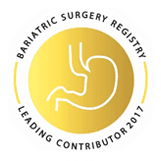 The Bariatric Surgery Registry (BSR) measures outcomes for patients who have undergone bariatric surgery across public and private hospitals in Australia. It is predominantly a health and safety registry. This registry is an important step in monitoring and evaluating patient outcomes across Australia, which is why it has attracted the support of the Obesity Surgical Society of Australia and New Zealand (OSSANZ) and the Royal Australasian College of Surgeons (RACS).
The Bariatric Surgery Registry (BSR) measures outcomes for patients who have undergone bariatric surgery across public and private hospitals in Australia. It is predominantly a health and safety registry. This registry is an important step in monitoring and evaluating patient outcomes across Australia, which is why it has attracted the support of the Obesity Surgical Society of Australia and New Zealand (OSSANZ) and the Royal Australasian College of Surgeons (RACS).
At present the BSR is still rolling out across Australia and not yet receiving data from all hospitals, but did have 102 hospitals and 126 surgeons participating as of December 2016. An initiative introduced by the BSR to increase surgeon participation was offering the accolade of “Bariatric Surgery Registry Leading Contributor”. In order to achieve this award the practice needs to submit at least 100 patients to the registry within the year and have a 70% follow-up rate with the data provided to the registry.
At Upper GI Surgery we are committed to the advancement of bariatric surgery here in Australia. Contributing to the BSR is something we are passionate about to allow real data to be captured and recorded that can help contribute to bariatric care in Australia. Last year we were awarded the Bariatric Surgery Registry Leading Contributor 2016; we plan on continuing our great relationship with the BSR and hope to achieve the same recognition in 2017.
Already the BSR is providing some really interesting statistics from the data they have been collecting; please see some of the key findings from 2016 below.
- 23,051 procedures in total (71% primary, 29% revision).
- 86% of procedures private, 14% public.
- Two dominant procedure types: sleeve gastrectomy 61% (up from 54% in 2015), gastric band 12% (down from 19% in 2015).
- 61% excess weight loss (of those that have reached the three years follow-up).
- 36% of patients that were treated for diabetes prior to surgery who now after surgery no longer identify as having diabetes.
The BSR relies heavily on practices committing to continue providing on-going data about their patients, with the view to gather ten year patient data in order to analyse the long-term effects of weight loss surgery. We will continue to commit to helping support the registry and expect that others will do the same.


0 Comments